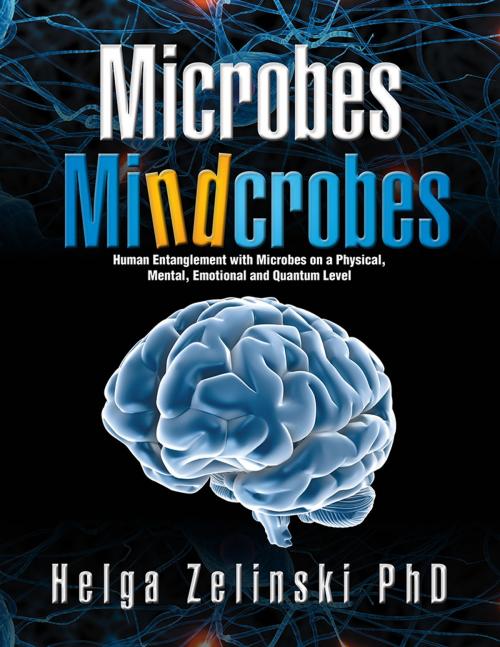Microbes Mindcrobes
Human Entanglement with Microbes on a Physical, Mental, Emotional and Quantum Level
Nonfiction, Health & Well Being, Medical, Medical Science, Microbiology, Science & Nature, Science| Author: | Helga Zelinski PhD | ISBN: | 9781514413470 |
| Publisher: | Xlibris US | Publication: | October 29, 2015 |
| Imprint: | Xlibris US | Language: | English |
| Author: | Helga Zelinski PhD |
| ISBN: | 9781514413470 |
| Publisher: | Xlibris US |
| Publication: | October 29, 2015 |
| Imprint: | Xlibris US |
| Language: | English |
Microbes were the first forms of life on this planet and have survived by adapting to ever-changing environments, from simple one-celled life forms to intelligent, decision-making, life-sustaining species in charge of many primary functions in Earths biochemical and biological balances. The scientific community estimates that life began approximately 3.5 billion years ago as a result of a complex sequence of chemical reactions that took place in Earths atmosphere. There was virtually no oxygen, and these first microorganisms were surviving by eating naturally occurring foods. Gradual changes to these earliest cells resulted in new life forms that were no longer dependent on the same food supply as their ancestors; they were able to feed themselves by using the energy of the sun. Without the activity of these early organisms, Earths atmosphere would still be without oxygen and the evolution of oxygen-dependent animals, including humans, would have never occurred. Microorganisms are found in every environment, from the deepest sea to the highest mountains and from the deserts to the poles. Microbes are in the air we breathe, the water we drink, and the food we eat. They are also found in the soil, plants, animals , and the human body. The number of bacteria living within the human body of the average human adult is estimated to outnumber human cells ten to one and is found mostly on our skin, the respiratory tract, the digestive system, and the oral cavity. Microbes control every aspect of our lives Exposure to bacteria and/or viruses and our interaction with these invaders will largely depend on the health of our internal environment and our mental/emotional state. In order to understand how changes in bacterial populations affect us, we must consider lifestyle, nutrition, personal hygiene, exposure to stress, pollution, and the environment. Many single organisms exhibit intelligence of a kind not seen in other species of the animal or plant kingdom. They neither have nervous systems nor brains but harbor an internal system that can be equated to a biological computer. To solve newly encountered problems, they assess the situation, recall stored data of past experiences, and then execute information processing, transforming the colony into a super brain. Bacteria do not just react to change in their surroundings; they anticipate and prepare for it. They are not simple solitary organisms. They are highly social and evolved creatures. They congregate to fend off enemies, meet challenges of nature to reproduce, obtain food, and maintain their critical environment. Some bacterial intelligence, if compared to human levels, is 60 points higher than the human average of an IQ of 100. Microbes can keep us healthy and fend off invaders or make us very ill and may kill us under the right circumstances. We must provide a healthy environment for our resident bacteria to flourish and to help us maintain physical, mental, and emotional health. Regenerating our individual bioterrain means forming alliances, not antagonisms, with the microbial community.
Microbes were the first forms of life on this planet and have survived by adapting to ever-changing environments, from simple one-celled life forms to intelligent, decision-making, life-sustaining species in charge of many primary functions in Earths biochemical and biological balances. The scientific community estimates that life began approximately 3.5 billion years ago as a result of a complex sequence of chemical reactions that took place in Earths atmosphere. There was virtually no oxygen, and these first microorganisms were surviving by eating naturally occurring foods. Gradual changes to these earliest cells resulted in new life forms that were no longer dependent on the same food supply as their ancestors; they were able to feed themselves by using the energy of the sun. Without the activity of these early organisms, Earths atmosphere would still be without oxygen and the evolution of oxygen-dependent animals, including humans, would have never occurred. Microorganisms are found in every environment, from the deepest sea to the highest mountains and from the deserts to the poles. Microbes are in the air we breathe, the water we drink, and the food we eat. They are also found in the soil, plants, animals , and the human body. The number of bacteria living within the human body of the average human adult is estimated to outnumber human cells ten to one and is found mostly on our skin, the respiratory tract, the digestive system, and the oral cavity. Microbes control every aspect of our lives Exposure to bacteria and/or viruses and our interaction with these invaders will largely depend on the health of our internal environment and our mental/emotional state. In order to understand how changes in bacterial populations affect us, we must consider lifestyle, nutrition, personal hygiene, exposure to stress, pollution, and the environment. Many single organisms exhibit intelligence of a kind not seen in other species of the animal or plant kingdom. They neither have nervous systems nor brains but harbor an internal system that can be equated to a biological computer. To solve newly encountered problems, they assess the situation, recall stored data of past experiences, and then execute information processing, transforming the colony into a super brain. Bacteria do not just react to change in their surroundings; they anticipate and prepare for it. They are not simple solitary organisms. They are highly social and evolved creatures. They congregate to fend off enemies, meet challenges of nature to reproduce, obtain food, and maintain their critical environment. Some bacterial intelligence, if compared to human levels, is 60 points higher than the human average of an IQ of 100. Microbes can keep us healthy and fend off invaders or make us very ill and may kill us under the right circumstances. We must provide a healthy environment for our resident bacteria to flourish and to help us maintain physical, mental, and emotional health. Regenerating our individual bioterrain means forming alliances, not antagonisms, with the microbial community.















